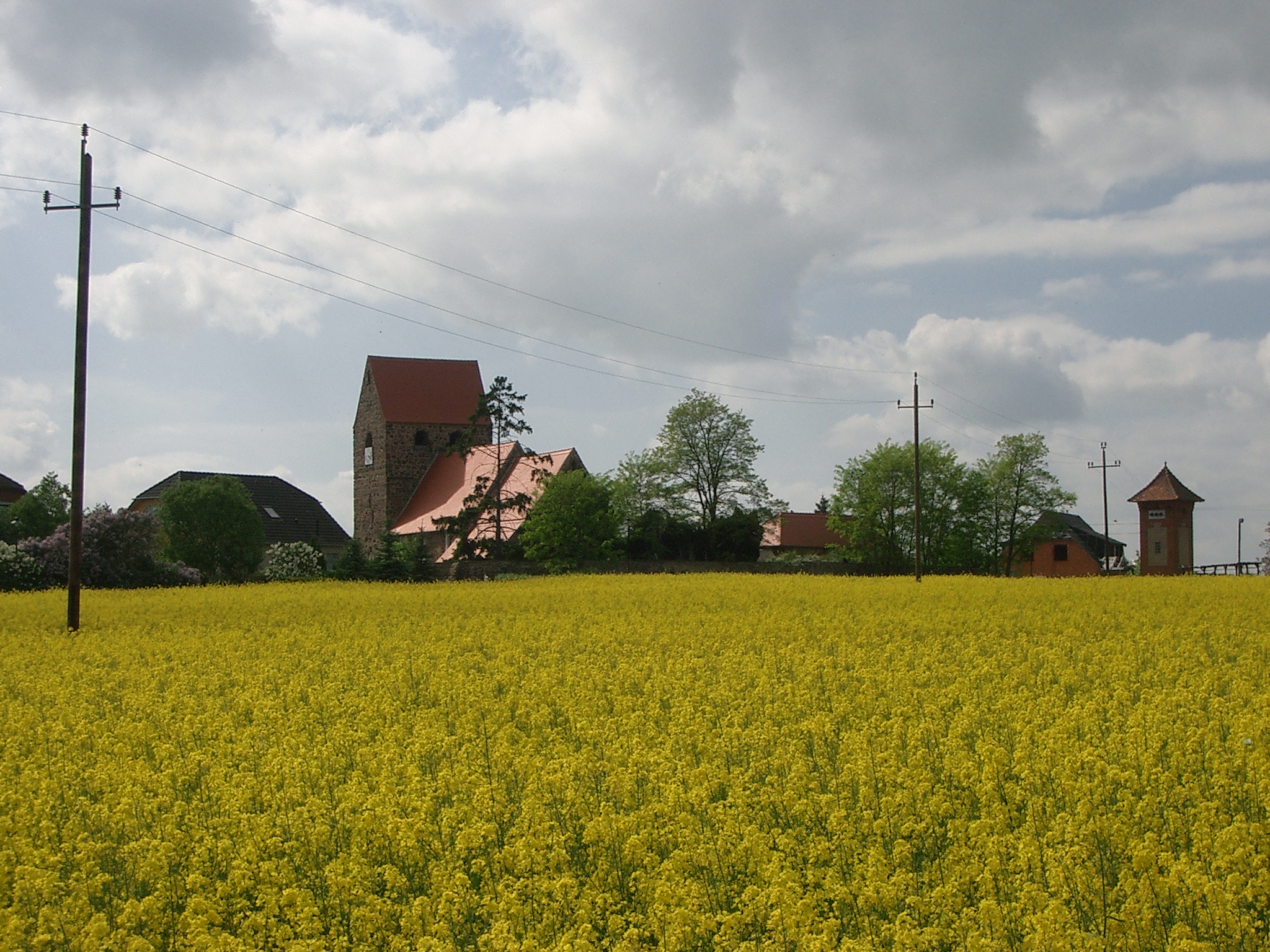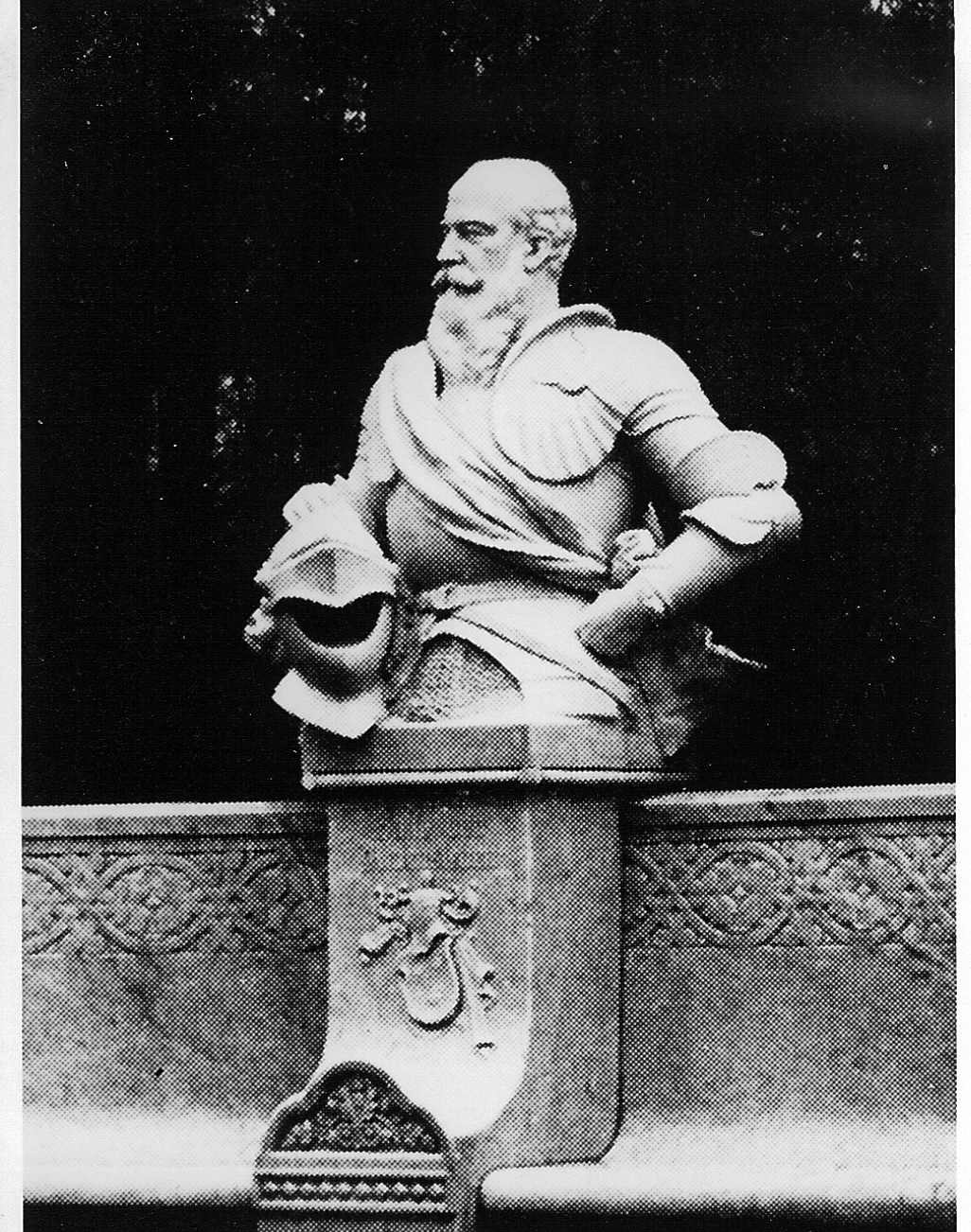|
Albert Manthe
Albert August Karl Manthe (18 August 1847, in Angermünde – 4 February 1929, in Berlin) was a German sculptor. He studied at the Prussian Academy of Art under August Julius Streichenberg, Hermann Schievelbein and Hugo Hagen. After some further training in London, he lived in Berlin for the rest of his life. Models, sketches and other items from his estate may be seen at the Heimatmuseum Angermünde. Selected major works * 1888: Berlin, Statues representing "Kriegskunst" and "Naturwissenschaft" (The Art of War and the Natural Sciences) in the City Palace (destroyed). * 1888: Berlin, Colossal bust of the young Kaiser Wilhelm II, carved in gypsum. * 1890: Berlin, Marble bust of Gustav Meyer on a red granite base in Treptower Park. * 1892: Spandau, Statue of Kaiser Friedrich III, at the north end of the Charlotte Bridge. It was dismantled in 1926 and reassembled at Hakenfelde in 1932. Its whereabouts are currently unknown. * 1893: Weißwasser, Upper Lusatia, Memorial for th ... [...More Info...] [...Related Items...] OR: [Wikipedia] [Google] [Baidu] |
Albert Manthe C
Albert may refer to: Companies * Albert (supermarket), a supermarket chain in the Czech Republic * Albert Heijn, a supermarket chain in the Netherlands * Albert Market, a street market in The Gambia * Albert Productions, a record label * Albert Computers, Inc., a computer manufacturer in the 1980s Entertainment * ''Albert'' (1985 film), a Czechoslovak film directed by František Vláčil * ''Albert'' (2015 film), a film by Karsten Kiilerich * ''Albert'' (2016 film), an American TV movie * ''Albert'' (Ed Hall album), 1988 * "Albert" (short story), by Leo Tolstoy * Albert (comics), a character in Marvel Comics * Albert (''Discworld''), a character in Terry Pratchett's ''Discworld'' series * Albert, a character in Dario Argento's 1977 film ''Suspiria'' Military * Battle of Albert (1914), a WWI battle at Albert, Somme, France * Battle of Albert (1916), a WWI battle at Albert, Somme, France * Battle of Albert (1918), a WWI battle at Albert, Somme, France People * Albert (given n ... [...More Info...] [...Related Items...] OR: [Wikipedia] [Google] [Baidu] |
Ehm Welk
Emil "Ehm" Welk (August 29, 1884 – December 19, 1966) was a German journalist, writer, professor and founder of ''Volkshochschulen'' (adult education centres). He became known for his work ''Die Heiden von Kummerow'' (''The Heathens of Kummerow'') and used Thomas Trimm as a pseudonym. Life Welk was born as the son of a farmer in Biesenbrow (now part of Angermünde), Brandenburg. After frequenting the village school, the 16-year-old moved away from home, completed a commercial education, worked on the sea and as a journalist for several papers, e.g. in Brunswick for the ''Braunschweiger Allgemeiner Anzeiger'', whose editor-in-chief he was from 1910 on to 1919. Afterwards, he worked for the '' Braunschweiger Morgenzeitung''. During these times, Welk experienced the German Revolution in Brunswick. His experiences later built the background for the novel ''Im Morgennebel'', that describes true Brunswick events and people of these times in a not much encrypted way. This novel' ... [...More Info...] [...Related Items...] OR: [Wikipedia] [Google] [Baidu] |
Franz Ludwig Späth
Franz Ludwig Späth (25 February 1839 – 2 February 1913), was a German botanist and fifth manager of the Späth nursery from 1863, when his father Ludwig Späth (1793–1883) retired,Späth, L. (1930). ''Späth-Buch'' 1720 - 1930, Self-Verlag, Berlin. until his death, when the nursery passed to his own son Hellmut Ludwig Späth Hellmut Ludwig Späth (4 December 1885 – 15 February 1945) was a German botanist and plant nursery owner, murdered by the Nazi party. His nursery is now Späth-Arboretum. Biography He was born 4 December 1885, the son of Franz and Wilhelmine ... (1885–1945). With his father Ludwig, Franz was a co-founder of the German Pomologists Association in 1860, and was made an honorary member in 1903. References 19th-century German botanists Nurserymen 1839 births 1913 deaths {{Germany-botanist-stub ... [...More Info...] [...Related Items...] OR: [Wikipedia] [Google] [Baidu] |
Stavenhagen
Stavenhagen () is a municipality in the Mecklenburgische Seenplatte district, in Mecklenburg-Vorpommern, Germany. It is situated 28 km northwest of Neubrandenburg. Subdivisions Stavenhagen is divided into following parts: History The town is first mentioned in 1230 under the name of ''Stovenhage''. The town was destroyed towards the end of the Thirty Years' War in 1648. Large fires in the years 1727 and 1746 also destroyed large parts of the town. Today's ''Schloss Stavenhagen'' (Stavenhagen Castle) was built in 1740 on the premises of an earlier fort. The town's church was re-built between 1774 and 1790 and also a new town hall was erected in 1788. The first lager beer brewery in Mecklenburg was founded in Stavenhagen in the first half of the 19th century. Fritz Reuter, a notable author (his works were among the best selling of his time), was born in 1810 as son of the mayor. Reuter is regarded one of the most prominent authors of Low German literature. In 1864, S ... [...More Info...] [...Related Items...] OR: [Wikipedia] [Google] [Baidu] |
Fritz Reuter
Fritz Reuter (7 November 1810 – 12 July 1874; born as ''Heinrich Ludwig Christian Friedrich Reuter'') was a novelist from Northern Germany who was a prominent contributor to Low German literature. Early life Fritz Reuter was born at Stavenhagen in the Duchy of Mecklenburg-Schwerin, a small country town where his father was mayor and sheriff (''Stadtrichter'') and, in addition to his official duties, carried on the work of a farmer. He was educated at home by private tutors and subsequently at Gymnasien in Mecklenburg-Strelitz and in Parchim. Education and student fraternities On 19 October 1831, Reuter began studying jurisprudence according to his father's wishes in Rostock. There he joined the Corps Vandalia Rostock, who expelled him again a short time later because of "rough behaviour" and " burschenschaft activities". In the winter term of 1831/32 he joined the Rostock Burschenschaft, a student fraternity. Throughout his life, Reuter was friends with Moritz Wiggers ... [...More Info...] [...Related Items...] OR: [Wikipedia] [Google] [Baidu] |
Ernst Moritz Arndt
Ernst Moritz Arndt (26 December 1769 – 29 January 1860) was a German nationalist historian, writer and poet. Early in his life, he fought for the abolition of serfdom, later against Napoleonic dominance over Germany. Arndt had to flee to Sweden for some time due to his anti-French positions. He is one of the main founders of German nationalism and the 19th century movement for German unification. After the Carlsbad Decrees, the forces of the restoration counted him as a demagogue. Arndt played an important role for the early national and liberal Burschenschaft movement and for the unification movement, and his song " Was ist des Deutschen Vaterland?" acted as an unofficial German national anthem. Long after his death, his anti-French propaganda was used again, in both World Wars. This, together with some strongly antisemitic and anti-Polish statements, has led to a highly critical view of Arndt today. Early life and studies Arndt was born at Gross Schoritz (now a part of ... [...More Info...] [...Related Items...] OR: [Wikipedia] [Google] [Baidu] |
Stralsund
Stralsund (; Swedish: ''Strålsund''), officially the Hanseatic City of Stralsund ( German: ''Hansestadt Stralsund''), is the fifth-largest city in the northeastern German federal state of Mecklenburg-Western Pomerania after Rostock, Schwerin, Neubrandenburg and Greifswald, and the second-largest city in the Pomeranian part of the state. It is located at the southern coast of the Strelasund, a sound of the Baltic Sea separating the island of Rügen from the Pomeranian mainland.'' Britannica Online Encyclopedia'', "Stralsund" (city), 2007, webpageEB-Stralsund The Strelasund Crossing with its two bridges and several ferry services connects Stralsund with Rügen, the largest island of Germany and Pomerania. The Western Pomeranian city is the seat of the Vorpommern-Rügen district and, together with Greifswald, Stralsund forms one of four high-level urban centres of the region. The city's name as well as that of the Strelasund are compounds of the Slavic ( Polabian) ''str ... [...More Info...] [...Related Items...] OR: [Wikipedia] [Google] [Baidu] |
Altmark
:''See German tanker Altmark for the ship named after Altmark and Stary Targ for the Polish village named Altmark in German.'' The (English: Old MarchHansard, ''The Parliamentary Debates from the Year 1803 to the Present Time ...'', Volume 32. 1 February to 6 March 1816, T.C. Hansard, 1816pp. 82 Article XXIII of the Final Act of the Congress of Vienna) is a historic region in Germany, comprising the northern third of Saxony-Anhalt. As the initial territory of the March of Brandenburg, it is sometimes referred to as the "Cradle of Prussia", as by Otto von Bismarck, a native from Schönhausen near Stendal. Geography The Altmark is located west of the Elbe river between the cities of Hamburg and Magdeburg, mostly included in the districts of Altmarkkreis Salzwedel and Stendal. In the west, the Drawehn hill range and the Drömling depression separate it from the Lüneburg Heath in Lower Saxony; the Altmark also borders the Wendland region in the north and the Magdeburg ... [...More Info...] [...Related Items...] OR: [Wikipedia] [Google] [Baidu] |
Landeshauptmann
Landeshauptmann (if male) or Landeshauptfrau (if female) (, "state captain", plural ''Landeshauptleute'') is the chairman of a state government and the supreme official of an Austrian state and the Italian autonomous provinces of South Tyrol and Trentino. His or her function is equivalent to that of a minister-president or premier. Until 1933 the term was used in Prussia for the head of government of a province, Duden; Definition of Landeshauptmann, in German/ref> in the modern-day states of Germany (with the exceptions of the city-states) the counterpart to ''Landeshauptmann'' is the ''Ministerpräsident'' (minister-president). Origins Since the early modern period, a ''Landeshauptmann'' originally served as governor under either a Prince of the Holy Roman Empire or the Emperor himself, mainly in the territories of the Habsburg monarchy (as for the Lands of the Bohemian Crown), later also in the Kingdom of Prussia. In the Austrian Empire, according to the 1861 Februar ... [...More Info...] [...Related Items...] OR: [Wikipedia] [Google] [Baidu] |
Busso VII Von Alvensleben
Busso VII von Alvensleben (fl. 1441–1495) was the Burgherr (Lord) of Kalbe, Chief Marshall and Stadtholder of Mark Brandenburg, and Landeshauptmann of Altmark. Biography He came from the "Low German" House of Alvensleben, and was the second son of Ludolf II von Alvensleben, from Kalbe. In 1443, together with his older brother, Ludolf IV (fl. 1441–1476), he was accepted into the Order of the Swan by Frederick II, Elector of Brandenburg. In 1464, he obtained the dignity of a Knight and became the Chief Marshall (Obermarschall). In 1470, following the abdication of Frederick II, he served as Stadtholder until the new Elector, Albrecht Achilles, who lived at Plassenburg in Kulmbach, was able to come to Brandenburg to take office.Mario Müller: "Dietrich von Stechow, Bischof von Brandenburg 1459–1472", in: Sascha Bütow, Peter Riedel, Uwe Tersp (Eds.): ''Das Mittelalter endet gestern.'' Beiträge zur Landes-, Kultur- und Ordensgeschichte Heinz-Dieter Heimann zum 65. Geburtstag ... [...More Info...] [...Related Items...] OR: [Wikipedia] [Google] [Baidu] |
Viadrina European University
European University Viadrina Frankfurt (Oder) (german: Europa-Universität Viadrina Frankfurt (Oder)) is a university located at Frankfurt (Oder) in Brandenburg, Germany. It is also known as the University of Frankfurt (Oder). The city is on the Oder River, which marks the border between Germany and Poland. With 5,200 students — around 1,000 of whom come from Poland — and some 160 teaching staff, the Viadrina is one of Germany's smallest universities (only the University of Erfurt and Jacobs University Bremen have fewer students). The Latin word ''Viadrina'' means "belonging to, or situated at, the Oder River"; it derives from ''Viadrus'', the name of a presumed river god of the Oder. Actually, an ancient name of the river is not documented, it is mentioned as ''Oddera'' in the 991 '' Dagome iudex'' referring to the realm of Prince Mieszko I of Poland. The Latin name was probably introduced by the Frankfurt scholar Jodocus Willich (c.1486–1552) and appeared in the '' C ... [...More Info...] [...Related Items...] OR: [Wikipedia] [Google] [Baidu] |






_-_Joachim_I_Nestor_-_Jagdschloss_Grunewald.jpg)